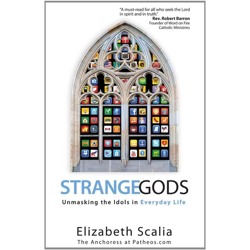“To become too attached to a thought or feeling or thing is to place it between God and ourselves,” Elizabeth Scalia tells us in the first chapter of Strange Gods: Unmasking the Idols in Everyday Life (14).
It seems that we often make those thoughts, feelings, or things into our Gods.
I am journaling my reading of Scalia’s book. I am a little behind in my journaling because we traveled to Las Vegas over Memorial Day weekend to check out the area that will soon be our home. The trip did give me a lot to think about in relation to our worldly idols. We all have some and I sure seem to have a bunch.
“Why do people allow their relationship with God to become disoriented?” asks Scalia. “Sadly, the

problem usually starts with love. The human heart craves attention and love–love is the common longing in our lives. We may search for a career, or wealth, or status, but the desire to be loved and valued is usually at the root of our strivings.” (15)
Later in the same paragraph, Scalia writes something that struck me…deeply: “Lacking loving relationships, we yearn instead for an audience” (15)
I love an audience. As a professor, blogger, politician, or commentator I have also loved having an audience. I love public speaking and karaoke.
It was 6 months ago today, that my life started to fall apart. I would say that the only thing that has survived has been my loving relationship with my family. My wife has been there through the worst of it. As have my three beautiful children. My parents and siblings have also been there for me. As have extended family and friends. That circle of friends is much smaller, but it is strong.
My campus audience disappeared in a flash. My political audience, whatever audience there may have been, moved on.
As my plans for the future went down the toilet, I found that something in addition to my family was still there. It was my faith in God. My faith in God is something that I started to rekindle during my campaign for Congress. Yet, it was when I hit rock bottom that I found God. I am less certain about dogma than I have ever been before. I am more skeptical of institutions and traditions than I have ever been. Yet, I still have faith.
Idols can come between us and God, they can also become between us and others, especially those most important to us. Later chapters talk about some more specific types of modern idols and I will deal with those then. Scalia places the two greatest commandments along side the Ten Commandments. While the Ten Commandments forbids idolatry, the two greatest commandments are to love God and to love our neighbors as ourselves (Matthew 22: 34-40). The two great commandments cannot be separated from each other. The negative impact of idolatry is being felt not only in our relationship with God, but also in our families, communities, and nation-states. Idolatry should be of both spiritual and secular concern.











